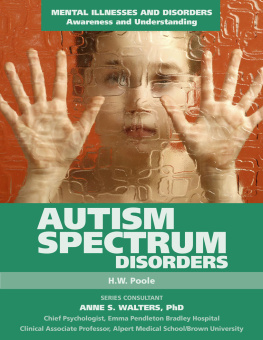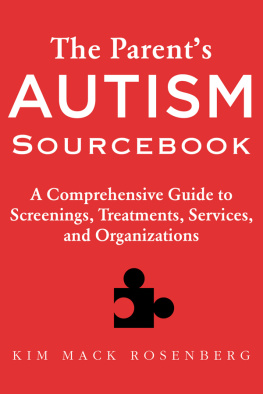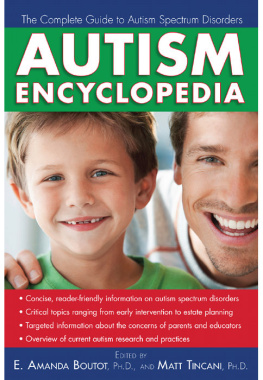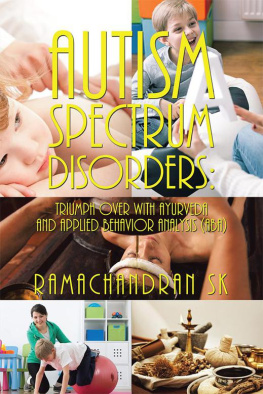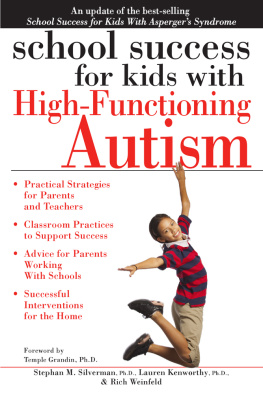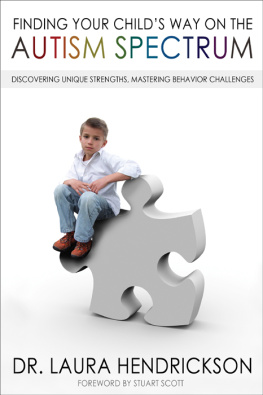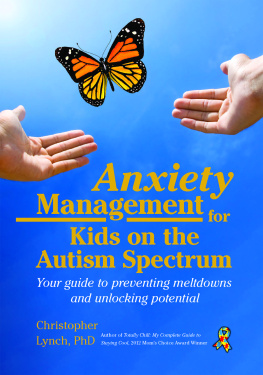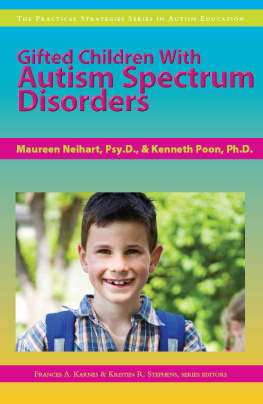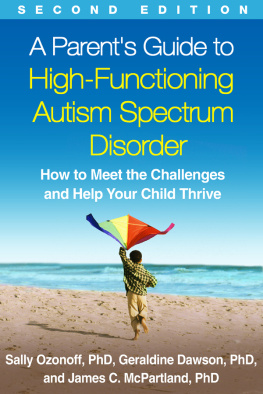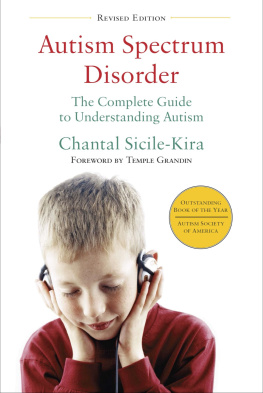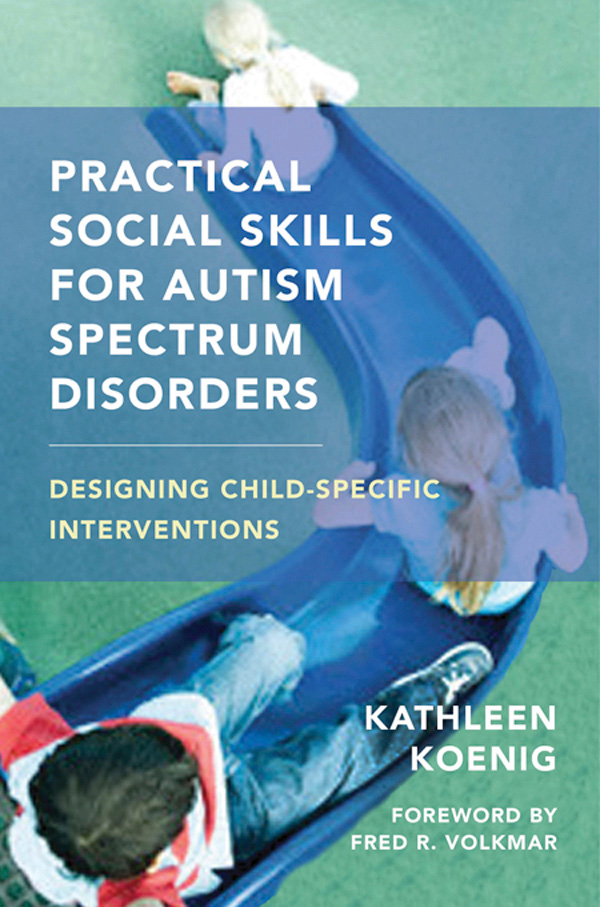
A Norton Professional Book
PRACTICAL SOCIAL SKILLS FOR AUTISM SPECTRUM DISORDERS
DESIGNING CHILD-SPECIFIC INTERVENTIONS
KATHLEEN KOENIG
Foreword by Fred R. Volkmar

W. W. Norton & Company
New York London
For Bob, Sam, and Emily
Contents

Foreword
Fred R. Volkmar
Social Development and Social Disability
in Autism Spectrum Disorders
Generalization: Adapting and Maintaining
New Behaviors
Acknowledgments

So many people have taught, helped, and supported me as I worked on this volume; there are truly too many to name. I will do my best.
My thanks and gratitude to the current and former faculty and staff of the Yale Child Study Center, especially Fred Volkmar, Ami Klin, Celine Saulnier, Kasia Chawarska, Leah Booth, Kathy Tsatsanis, Jamie McPartland, Julie Wolf, Sara Sparrow, Dom Cicchetti, Rhea Paul, Pam Ventola, Larry Scahill, Andrs Martin, Karyn Bailey, Bob Schultz, Kyle Pruett, Phyllis Cohen, Denis Sukhodolsky, Tammy Babitz, Lori Klein, Liz Schoen, Moira Lewis, Monika Lau, Stephanie Maynard, Emily Hau, Wendy Marans, and Stephanie Myles Orleski; each has been a teacher, mentor, and friend.
Thank you to my many colleagues working with and on behalf of children on the autism spectrum, especially Connie Kasari, Nancy Moss, Michael Powers, Jim Loomis, Rosalie Greenbaum, Lois Rosenwald, Deirdre Peterson, Jim Martin, Fred Rapczynski, Ruth Eren, and Susan Williams White.
Finally, a big thank you to Andrea Costella Dawson and Vani Kannan, two thoughtful and patient editors who provided all the support and encouragement I needed.
Foreword

Since the first description of the syndrome of infantile autism (Kanner, 1943) difficulties in the area of social development and interaction have consistently been identified as a, if not the , core vulnerability in autism (Carter, Davis, Klin, & Volkmar, 2005). Social impairments consistently emerge as some of the strongest predictors of diagnosis and prognosis (Siegel, Vukicevic, Elliott, & Kraemer, 1989). Over the last decade it has become increasingly clear that these early social vul nerabilities set the stage for a wide range of later learning problems with very serious impact on the childs overall development and adaptation.
Until recently, interventions to promote social development in children with autism spectrum disorders have been less systematically studied than other aspects of autism; this, in part, has refl ected a lack of a sufficient research base for understanding etiology. However, research has now begun to clarify the brain basis of some of the social difficulties observed (Kaiser et al., 2010; Schultz et al., 2000). Further, work from our Center has suggested that when viewing social scenes individuals with autism/Aspergers disorder may miss a majority of the social-emotional cues given their difficulties in processing social information (Klin, Jones, Schultz, Volkmar, & Cohen, 2002). These difficulties emerge very early in life and pose substantial challenges for children on the autism spectrum. Over time, the social impairment is compounded as children with autism spectrum disorders continue to miss important social and contextual information that would inform social understanding. As a result it is not uncommon for teenagers on the spectrum to have social difficulties much like those of preschoolers, in some respects; this, in turn, poses further challenges given the potential for social isolation, teasing, anxiety, and other problems.
Social impairments have increasingly been identified as targets for intervention in recent years. Some of the earliest work in this area occurred within the ABA (applied behavior analysis) approach, which explicitly focused on helping the child learn to develop a shared focus of interest and joint attention with adults (Lovaas & Smith, 1988). Similarly many communication-based programs of intervention also explicitly incorporate a social -communication skills teaching component (Tager-Flusberg, Paul, & Lord, 2005). An awareness of the potential for typically developing peers to foster social development in young children with autism has also been emphasized in many model treatment programs (National Research Council, 2001; Strain & Schwartz, 2001) and intervention models have incorporated social goals into overall treatment programs (Rogers et al., 2006).
As a result of this increased interest a variety of social skills intervention programs have been developed over the past decade (Volkmar & Wiesner, 2009). In this regard, this book is timely in describing a number of these approaches that can now be regarded as evidence based; that is, there has been sufficient evidence to show that they work and are transportable (Reichow & Volkmar, 2010). These include adult-mediated teaching (parent/teacher/clinician), group intervention (a hybrid approach with an adult or adults and peerseither typically developing or having some developmental difficulty), and peer-mediated approaches (the last used with preschoolers in particular). Parents, siblings, and other family members can be especially important in helping children on the autism spectrum generalize the skills they learn from one setting to another.
In this volume, my colleague Kathy Koenig describes the extant research supporting several broad-based approaches to social intervention as well as a number of evidence-based strategies for intervention. The careful attention to the range of strategies and the importance of considering the needs of the individual child is highlighted, as is the importance of using an integrated approach. Importantly, interventions to promote social development and case examples are presented for the entire range of children and teens with autism spectrum disorders, not just those who are verbal or functioning intellectually in the average to above average range.
Beyond learning what best practices and evidence-based strategies are available to address the needs of children with autism spectrum disorders, Koenig addresses the issues that parents and teachers face, as well as the implications of IDEA 2004 for educators. With a wealth of practical and useful information this volume will be profoundly helpful to teachers and professionals as they consider the needs of the individual child and develop effective interventions to foster social abilities.
Fred R. Volkmar, MD
Irving B. Harris Professor in the Yale Child Study Center
and Professor of Pediatrics, Psychiatry and Psychology
Yale University School of Medicine
CHAPTER ONE
Social Development and Social Disability in Autism Spectrum Disorders

How do we help children or teens with autism spectrum disorder (ASD) lead a life of full engagement with their family and community, with satisfying personal relationships, and an excellent quality of life? This question has parents, educators, clinicians, scientists, and other professionals reading, studying, and testing various approaches as they work with children. Wading through the mountains of information in books, online, and in the media is exhausting and frustrating because there does not seem to be any single, clear way for parents and professionals to proceed. And while this is true, researchers and expert clinicians have made important headway into understanding these disorders in terms of what helps children and what does not. In fact, children can make excellent progress learning new social behaviors, if provided with a comprehensive intervention program. But this cannot be had using a cookbook approach, with the recipe for social success laid out in detailed lessons. Interventionists need a blueprint to guide their own choices for designing intervention for a particular child, and this book aims to be that blueprint.
Next page

